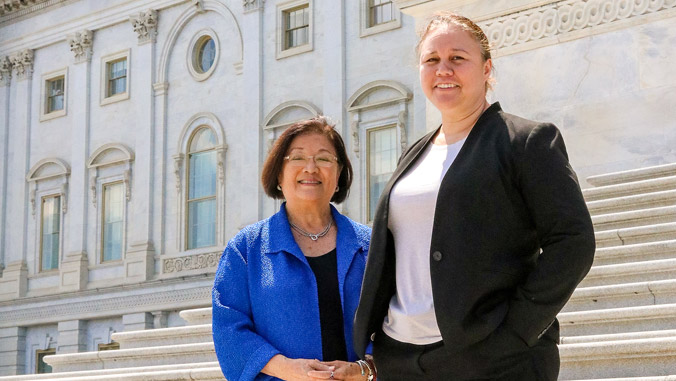
The first Native Hawaiian woman to serve as chief of staff for a United States Senator is a 2007 graduate of the University of Hawaiʻi at Mānoa William S. Richardson School of Law. Born and raised in Hawaiʻi, Coti Haia grew up splitting her time between Mililani and Waimānalo and spending summers on Lānaʻi. She has served in her current role for Sen. Mazie Hirono since 2022.
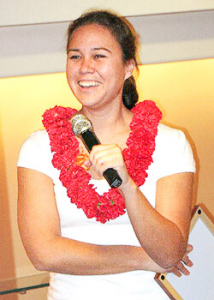
“There would be days when you walk in the Capitol, it would become mundane, and then one day you’d stop and be like, ‘My gosh, I’m in the Senate, this is crazy,’” said Haia. “I’ve been able to work for Hawaiʻi the entire time, and that’s really important to me.”
Haia graduated from Punahou School and Gonzaga University and worked as deputy prosecuting attorney for the City and County of Honolulu after earning her law degree. She moved to Washington D.C. in 2010 to work for the late U.S Sen. Dan Inouye before moving to Hirono’s office in 2013 after her election to the Senate.
After a two-year stint as the D.C. Bureau Chief for the Office of Hawaiian Affairs, she returned to Hirono’s office in 2018 as the deputy chief of staff, and was promoted four years later to chief of staff.
Paddling in the same direction
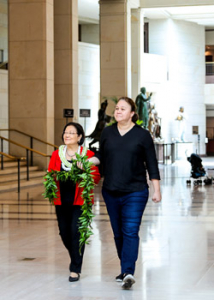
“Every day is something different. Some would say that your responsibility is to put out the biggest fire of the day,” said Haia. “Sometimes the fires can be as big as, ‘Do we have enough copies of a bill to file down on the Senate floor?’ And sometimes they can be significantly more challenging. I like to think of it as helping everyone paddle the canoe in the same direction. And sometimes that means going around an obstacle or through one.”
She does not dwell on her trailblazer status as the first Native Hawaiian woman chief of staff, and possibly the first ever Indigenous woman in that position in the history of the U.S. Senate.
“I think the way it plays out in our office is ensuring a level of diversity,” said Haia. “Senator [Hirono] has the most diverse staff in the Senate, and that’s because we have the opportunity to work with, and represent, such a diverse state. There are colleagues of mine who are from Hawaiʻi Island, Maui, Kauaʻi, all over Hawaiʻi to help us inform the work we do.”
Introduction to D.C. via UH
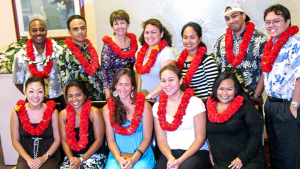
Her first exposure to Washington D.C. was while she was at UH through an internship with Sen. Dan Inouye offered through the law school’s Center for Excellence in Native Hawaiian Law.
“It’s not as if I ever planned to come to D.C. to work on policy, but it was through UH that I was able to do that,” said Haia. “Hawaiʻi has many unique laws specific to our state because of the Native Hawaiian community. The Center for Excellence in Native Hawaiian Law helped put an emphasis on parts of the federal government’s relationship with the native community that you would not learn at other law schools.”
Haia is still in touch with many of her professors, which has been useful with Hirono serving on the Senate Judiciary Committee.
“I can email them whether they are retired or not and ask them for their thoughts,” said Haia, who said it would take all day to list the professors who have had a positive impact on her. “I especially want to shout out Melody MacKenzie, Eric Yamamoto and Hazel Beh. We have a lot of aspiring law students who come to work here and those that are from Hawaiʻi, I strongly encourage them to go to Richardson.”
Encouraging the next generation
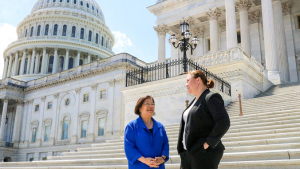
She said January 6, 2021, was her worst day since moving to D.C. more than a dozen years ago. On the flip side, there have been victories.
“I’m really a policy person, that’s what I came to the Senate to do, and we’ve had some really big policy wins,” said Haia, who adds that she is also proud of how outspoken Hirono has become in recent years. “She definitely began to use her voice during the Trump administration. Whether you agree with his policies or not, it was very clear that Sen. Hirono was a diametric opposite on pretty much every policy he had.”
Despite being in the seat of power of one of the most powerful countries in the world, one of Haia’s favorite parts of her job is lunch with the office interns.
“What I try to say to them is to not sell yourself short and to know what is important to you,” said Haia. “Be prepared to take an opportunity and to trust that you’ll succeed at it. I never in a million years would have guessed that I would be working in the U.S. Senate and certainly not in this position.”

